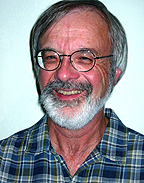Charles Paden
Professor Emeritus

Charles Paden
Neural plasticity and repair; Neuroendocrinology
My principle research area is the neural response to brain injury, with an emphasis on axonal sprouting in neuroendocrine systems.
Our research focuses on the response of the mammalian brain to injury, particularly the growth of new axon processes (axonal sprouting) by uninjured neurons. Many CNS neurons are known to be capable of growing new axon branches in response to either nervous system injury or altered patterns of activity. This growth response by mature intact neurons, termed collateral sprouting, can cause significant changes in the functional activity of mature CNS systems. However,in spite of its importance as a mechanism of neuronal plasticity, very little is known regarding the cellular mechanisms that control the timing, extent, and functional outcome of the sprouting response. Since varying degrees of neuronal loss occur in virtually every form of CNS injury or degenerative disease, a better understanding of the factors that influence reactive collateral sprouting may contribute to the ultimate design of effective therapies.
Our laboratory employs techniques including immunocytochemistry, image analysis and confocal microscopy, anterograde and retrograde tract tracing, gene chip analysis, quantitative PCR, and in situ hybridization to investigate axonal plasticity in vivo. For studies of injury-induced collateral sprouting, we utilize the magnocellular neurosecretory system (MNS). Neuroendocrine axons are particularly adept at sprouting, and thus provide an excellent model system. The neurons of the MNS are clustered within the paraventricular and supraoptic hypothalamic nuclei, and their axons project through the pituitary stalk to the neural lobe of the pituitary. Following a lesion that destroys one side of this bilateral system, the uninjured contralateral MNS neurons become hyperactive while simultaneously sprouting new axon branches that reestablish the axon population of the neural lobe within four weeks. Our current work focuses on identification of the growth factors and related signaling pathways involved in stimulating this axonal growth response.
Selected Publications
Watt, J.A., S. Bone, M. Pressler, H.J. Cranston, and C.M. Paden, 2005. Ciliary neurotrophic factor is expressed in the magnocellular neurosecretory system of the rat in vivo: evidence for injury- and activity-induced upregulation. Experimental Neurology 197: 206-214.
Babcock A.M., D. Standing, K. Bullshields, E. Schwartz, C.M. Paden, and D.J. Poulsen, 2005. In vivo inhibition of hippocampal Ca++/calmodulin-dependent protein kinase II by RNA interference. Molecular Therapeutics 11: 899-905.
Mueller NK, Di S, Paden CM, and Herman JP, 2005. Activity-dependent modulation of neurotransmitter innervation to vasopressin neurons of the supraoptic nucleus. Endocrinology 146: 348-354.
Biegon, A., P.A. Fry, C.M. Paden, A. Alexandrovich, J. Tsenter, and E. Shohami, 2004. Dynamic changes in N-methyl-D-Aspartate receptors after closed head injury in mice: Implications for treatment of neurological and cognitive deficits. Proc. Natl. Acad. Sci. U.S.A. 101: 5117-5122.
Babcock, A.M., A. Everingham, C.M. Paden, and A. Kimura. 2002. Baclofen is neuroprotective and prevents loss of calcium/calmodulin-dependent protein kinase II immunoreactivity in the ischemic gerbil hippocampus. J. Neuroscience Research 67: 804-811.
Watt, J.A., and C.M. Paden, 2001. Upregulation of the p75 low affinity neurotrophin receptor by phagocytically active perivascular cells in the rat neural lobe. Cell and Tissue Research 303: 81-91.
Watt, J.A., C.W. Moffett, X. Zhou, S. Short, J.P. Herman, and C.M. Paden, 1999. Central peptidergic neurons are hyperactive during collateral sprouting and inhibition of activity suppresses sprouting. J. Neuroscience 19: 1586-1598.
Zhou, X., J.P. Herman, and C.M. Paden, 1999. Evidence that IGF-I acts as an autocrine/paracrine growth factor in the magnocellular neurosecretory system: neuronal synthesis and induction of axonal sprouting. Experimental Neurology 159: 419-432.
Education
B.A. Harvard College, Chemistry and Physics, 1969
Ph.D. University of Colorado, Biopsychology, 1978
Postdoctoral, Rockefeller University, Neuroendocrinology, 1981
Activities
Affiliate Professor, Department of Biological Structure, University of Washington School of Medicine
Graduate Program Coordinator, Deptartment of Cell Biology and Neuroscience
